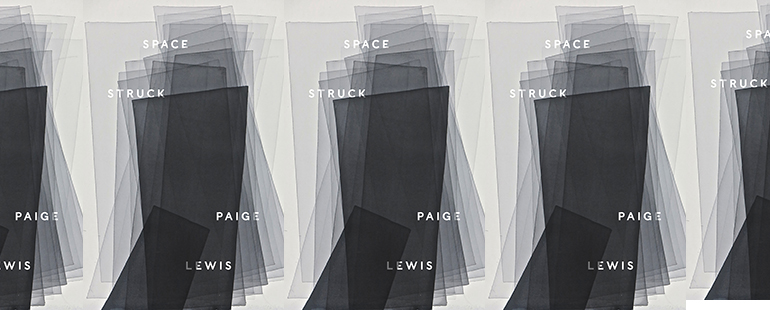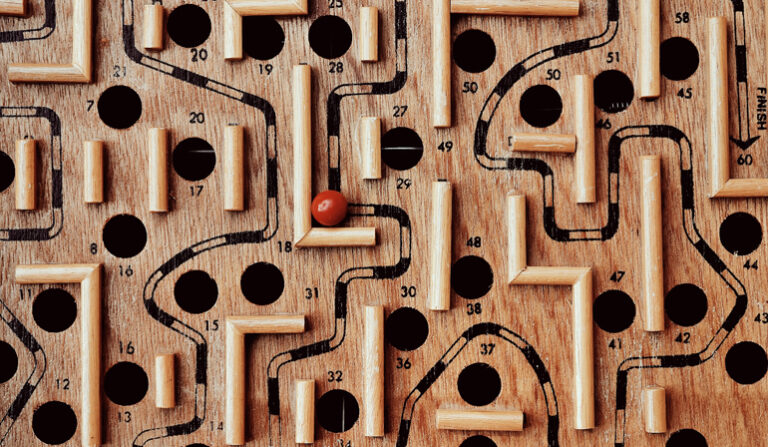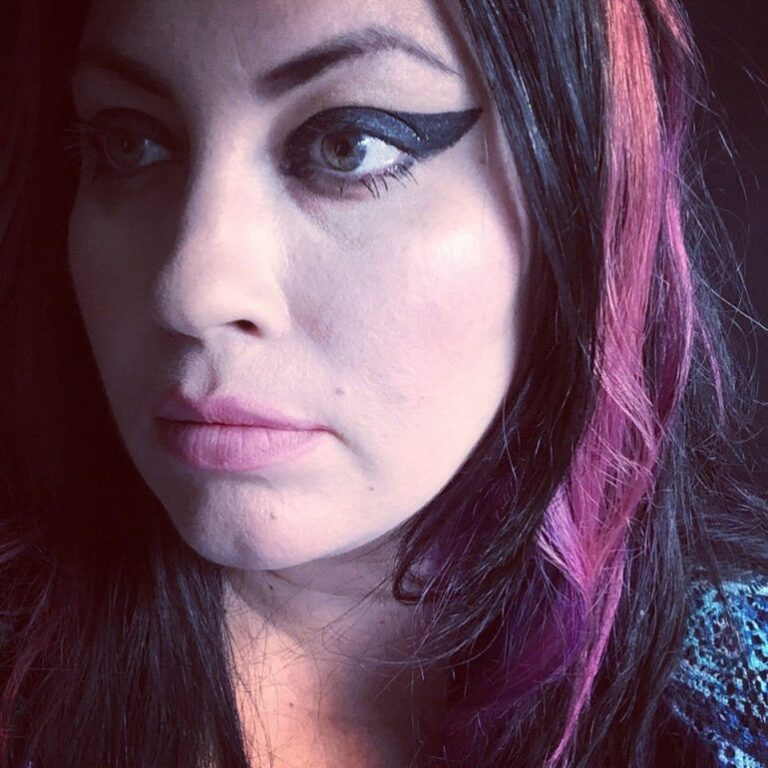The Grief of the Anthropocene in Paige Lewis’s Space Struck

“I’m going to show you some photos,” opens Paige Lewis’s 2019 collection, Space Struck, “extreme close-ups of normal, everyday / creatures.” The speaker seems to be giving instructions from a future that lurks eerily close. “When you guess each creature / right,” they tell us, “you guess each creature into being. / Soon you’ll have enough to open a zoo, / and people will visit because it’s not every day / they get to see everyday creatures in cages.” Right from the start, Lewis begins to construct a reflection of our lives in the Anthropocene, the current geological era in which human activity is the main influence on Earth’s environment. Inextricably intertwined with this seeming power, however, is a deep grief for the loss of a world that we suspect once existed, that we catch glimpses of, but that eludes us more each day.
Over and over again, the characters in Space Struck seek the natural world but encounter institutions, which in the collection (and, one gets the uncanny sense, in our actual lives) are rapidly becoming one of the last ways to experience nature. In a poem, “The Terre Haute Planetarium Rejected My Proposal,” whose title leads into the line “for more tactile audience participation,” the speaker reflects: “Sure, their decision makes sense / if you consider the fact that no one likes / being pelted by meteorites.” Still, a desperation for something more tactile runs through the poem, and the continuous rejection eventually transforms that desperation into grief. “Lately, I’ve been feeling betrayed by names,” the speaker says. “The king cobra isn’t a cobra, the electric / eel isn’t an eel, and it turns out my anger / was fear all along.”
The wealthiest countries contribute the most to climate change, while the poorest countries are most affected; the wealthiest countries aren’t scrambling to fix the problem—some leaders argue instead over whether the problem even exists—while hurricanes that move excruciatingly slowly due to hot sea temperatures obliterate island infrastructure. “The Terre Haute Planetarium Rejected My Proposal” offers an apt metaphor for what will soon be our present era, if it isn’t already: “I’m like a snake who, having / swallowed its fill of goose eggs, can / no longer escape through the gaps in the cage.” Lewis ends the somewhat future-oriented poem with a chilling scene from our present political climate. “The hurt can be heard / asking the same question,” they write. “Why isn’t anybody / stopping this? And the powerfully worse take / a vote, they elect their answer carefully: / Stopping what?” When the climate crisis reaches a point where the countries that can make a difference have no choice but to act, they will realize they are the snake who has swallowed so many goose eggs they can no longer escape the cage.
It’s easy to romanticize nature, especially as it grows distant and our experiences of it become institutionalized, with more and more animal species existing only in captivity. But Lewis resists this inclination, even as the characters in Space Struck long for the natural world. In the bluntly titled poem “No One Cares Until You’re the Last of Something,” a line of binoculared men enter the speaker’s home to watch a woodpecker on the back porch. The poem reflects the ways that capitalism and nature cannot be separated anymore, and how, from our individual perspectives, we may not even notice, and may even feel relieved. “I’m sure there’s an alternate / universe where my gaze is unwavering,” the speaker says, “where I’m paid / to name the newest nail polish colors—Fiddlehead / Green, Feral Red, Geothermal Glitter—where / I don’t hate documentarians for letting nature be / its gruesome self.” Humans crave nature, but instead of using this longing to protect ecosystems on our planet, we name our nail polish after it. We put on “splendid hiking shorts,” grab a pair of binoculars, and set up in someone’s living room to surveil some of the last birds that are left nesting naturally.
The birdwatchers note, “Doesn’t he look happy? Yes, they / all agree. Don’t you think he sounds like Fred Astaire / with his tap-tap-tapping?” In the Anthropocene, everything is anthropomorphized. Later in the collection, a person walks through a store with women who “look as if they’d smell like pink magnolias / and violin rosin if I got close enough, / but I won’t. I’m too busy searching for / the stone that best represents me.” All nature becomes a reflection of ourselves, part of our personal brands. I am the type of person who smells like pink magnolias. Struggling to find a stone that best represents them, the speaker considers “how hard it is for me to believe / in the first Adam because if Adam / had the power to name everything, / everything would be named Adam.” Between the nail polish colors, the stones, birds that sound like tap dancers, creatures in cages that we love to look at but not actually experience, the world becomes human—only human—which nearly makes us into gods. But it turns out that we don’t actually want to be gods. It turns out that makes us uneasy too.
In contrast to the voices throughout the collection that construct and maintain institutions, a voice emerges that feels like the present-moment voice of a human who has been thrust into the world and is trying their best to survive there. Saints and God appear, but they are always just like us, desperate in the same specific ways. In “God Stops By,” God stops by to “show me how healthy He’s been. He’s / sleeping more. He built his own gym.” The characters seem to be searching for something holy, and instead, they end up with something human. In “St. Francis Disrobes,” when Saint Francis—the patron saint for ecologists— materializes in an apartment, the speaker says, “I figured I was in for a quick / message from the Almighty—Thou / shalt lose weight, or Thou shalt not lie / with thine physics professor.” But instead, Saint Francis stands around sighing “five sighs / per minute” and removing infinite layers of woolen clothing. He never speaks, never offers commands or even any guidance, only a subtle acknowledgement that maybe the world is hard for everyone to live in, that maybe there are no answers to give.
“A miracle is anything that God forgot / to forbid,” writes Lewis. But they don’t just mean beautiful things. They also mean the horrible parts of capitalism—humans taking advantage of other humans, radiation exposure caused by corporations telling women who work for them to lick their radium-stained paintbrushes into sharp points. “The miracle here / is not that these women swallowed light,” writes Lewis. “It’s that, / when their skin dissolved and their jaws fell off, / the Radium Corporation claimed they all died / from syphilis.” God is not a figure who will save us from ourselves—God is someone who left gaps through which we can destroy each other and ourselves. This, too, is the grief of the Anthropocene. There is nobody coming to save us from ourselves; there is no inhuman being with enough omniscient power to fix what harm we have caused.
And so, Lewis also includes the ways we learn to live with ourselves—the resignation and the desperation and the longing for something more powerful than we are. “Space Struck,” the title poem, is written in the persona of Ann Hodges, the first confirmed meteorite victim. “I woke to light streaming / through the ceiling,” Ann says. “I think I thought it was God, / since I’d been told it’s painful to bear witness.” This seems a disappointment and a relief at once. “At any rate,” Ann concludes, “it was a blessing to my husband, / who pretends the bruise is still there. At night, / he lifts my nightgown and kneads my thigh. / He says, How deep, like he’s reaching into a galaxy.” Chance natural phenomena like falling meteorites are the only signs left that we are not the gods we think we are, that we are not all-powerful and therefore not all-responsible.
Earlier, in “Golden Record,” Lewis observes, “On this planet, you have to be useful / to be kept around.” Later, in “Pavlov Was the Son of a Priest,” they say, “I’m sorry / I couldn’t hide my joy when you said lonely. / It made me feel useful.” This is how we survive—how we survive ourselves, our beloveds, our universe. “I used to be aimless,” they write, “swallowing marbles and clicking my way / through cities … Now, I / demand a love that is stupid and beautiful, / like a pilot turning off her engines mid-flight / to listen for rain on wings.” The most romantic declarations in the book are the most intense descriptions of nature—craving nature so intensely one is willing to fall to earth and die for it, pressing a peach “so ripe that even your breath / would bruise it” against a beloved’s cheek, offering to “make you edge / into the bite until your mouth is too wet / to ask questions.” The answer, Lewis suggests in the sexiest, most determined moments, is to look away from institutions, to remind ourselves that our beloveds are not gods and that’s okay, because even our holy figures do not do a good job being holy.
The second to last poem is titled “So You Want to Leave Purgatory,” and we do. We want to leave this purgatory in which we have almost destroyed our earth but aren’t one-hundred-percent certain it’s irreversible. Where we might have a chance to save ourselves but, as individual people, don’t have enough power to make it happen. Where, as the notes God leaves the speaker in “God Stops By” say, “You are the bridge” and “You are the dust.” We are both at once. We live in this in-between space, and we must learn to live there. “So You Want to Leave Purgatory” ends with the same scene it begins with: “Here, take this knife.” Purgatory is a cycle in which we will remain until, if we’re lucky, a meteorite crashes through our roof and wakes us up.
When Notre Dame was burning, the writer Sophia Benoit tweeted, “I think part of why this is so sad is that we all know that with climate change & natural disasters on the rise, this is going to keep coming. Many people have said this feels like an omen, and it kind of is. But it’s also grief practice.” Notre Dame was human-made, but we thought it would last forever. We took its endurance for granted. We, too, take for granted that life on Earth will last forever. We are wrong about all of this.
In “On the Train, a Man Snatches My Book,” Lewis writes, “Most nights, I calm myself by listing / animals still on the Least Concern end of the / extinction spectrum.” But by the end of the list, they flow right into, “I don’t think I’ve ever written / the word doom, but nothing else fits.” Then, the poem cuts to this scene: “right now, this train / is approaching the station where my beloved / is waiting to take me to the orchard, so we can / pay for the memory of having once, at dusk, / plucked real apples from real trees.” And maybe this is the most grief-ridden moment of all. During every waking minute, we live with the knowledge that, one inevitable day, we will no longer even be able to pay to pluck real apples from real trees.
This piece was originally published on November 5, 2019.


